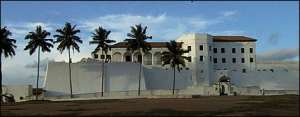
EVEN in the dank and dim corners of Elmina castle, behind half a metre thick whitewashed walls made of stone, the sound of the ocean crashing on the shore can still be heard.
For nearly 400 years that ocean pounding the west coast of Africa carried millions of its people, packed tightly in ships, to the Americas for a life of labour, humiliation and cruelty.
As Ghana marks its 50th anniversary of independence next year - the first African country to cast off its colonial ruler - it will conduct an unprecedented tourism campaign aimed at black people scattered across the globe by the slave trade.
Project Joseph is an invitation to black people to reconnect with the land of their ancestors - and it comes with an apology, not from the countries most commonly associated with slave masters or slave traders, but from Ghanaians themselves.
"The reason why we wanted to do some formal thing is that we want to be seen to be saying sorry to those who feel very strongly, and who we believe have distorted history, because they get the impression that it was people here who just took them and sold them," said Emmanuel Hagan, director of research and statistics at Ghana's Ministry of Tourism and Diaspora Relations.
"It's something we have to look straight in the face and try to address because it exists. So we will want to say something went wrong, people made mistakes but we are sorry for whatever happened."
The United Nations Educational, Scientific and Cultural Organisation estimates that 17 million people were forcibly taken from West Africa to the Americas.
Hundreds of thousands more died far from home and without proper burial during the brutal overland march to slave-trading forts like Elmina, where they were kept in shackles and branded with irons before being packed into ships.
Most textbooks exploring the history of African slavery place the blame for the trade on colonialist countries such as Portugal or the Netherlands, and the countries that bought their human cargo, such as the US, Brazil and Britain.
The idea that Africans may have sold their own into slavery is mostly ignored. Ghana, however, has never shied away from it. "Long before the coming of Europeans to the Guinea coast of Africa our local people here themselves already had slavery in existence," said Philip Amoa-Mensah, a guide at Elmina castle.
"The story is not told to open old wounds, nor is it told to magnify the strength of Africans, that they endured as people and yet survived.




 There’s nothing you can do for us; just give us electricity to save our collapsi...
There’s nothing you can do for us; just give us electricity to save our collapsi...
 Ghanaian media failing in watchdog duties — Sulemana Braimah
Ghanaian media failing in watchdog duties — Sulemana Braimah
 On any scale, Mahama can't match Bawumia — NPP Youth Organiser
On any scale, Mahama can't match Bawumia — NPP Youth Organiser
 Never tag me as an NPP pastor; I'm 'pained' the 'Akyem Mafia' are still in charg...
Never tag me as an NPP pastor; I'm 'pained' the 'Akyem Mafia' are still in charg...
 Your refusal to dedicate a project to Atta Mills means you never loved him — Kok...
Your refusal to dedicate a project to Atta Mills means you never loved him — Kok...
 2024 elections: I'm competent, not just a dreamer; vote for me — Alan
2024 elections: I'm competent, not just a dreamer; vote for me — Alan
 2024 elections: Forget NPP, NDC; I've the Holy Spirit backing me and nothing wil...
2024 elections: Forget NPP, NDC; I've the Holy Spirit backing me and nothing wil...
 2024 elections: We've no trust in judiciary; we'll ensure ballots are well secur...
2024 elections: We've no trust in judiciary; we'll ensure ballots are well secur...
 Performance tracker: Fire MCEs, DCEs who document Mahama's projects; they're not...
Performance tracker: Fire MCEs, DCEs who document Mahama's projects; they're not...
 Train crash: Railway ministry shares footage of incident
Train crash: Railway ministry shares footage of incident
